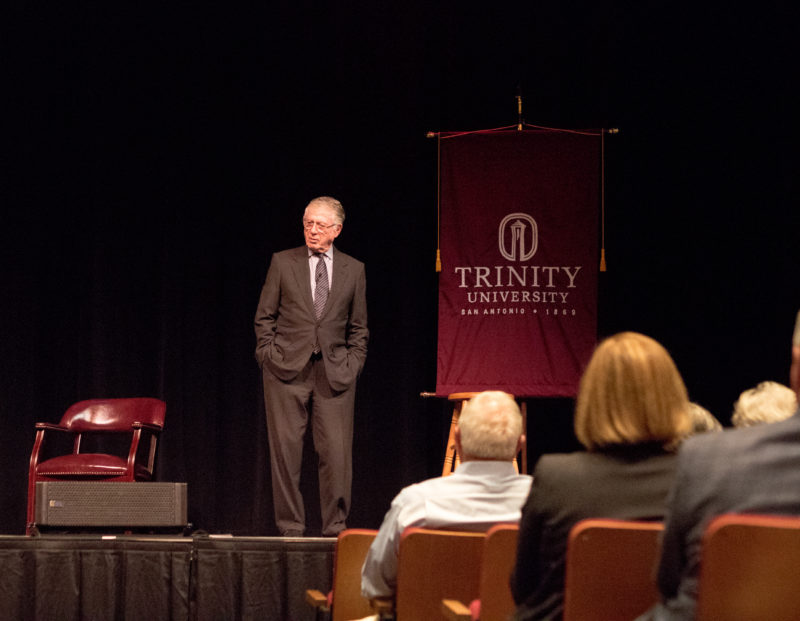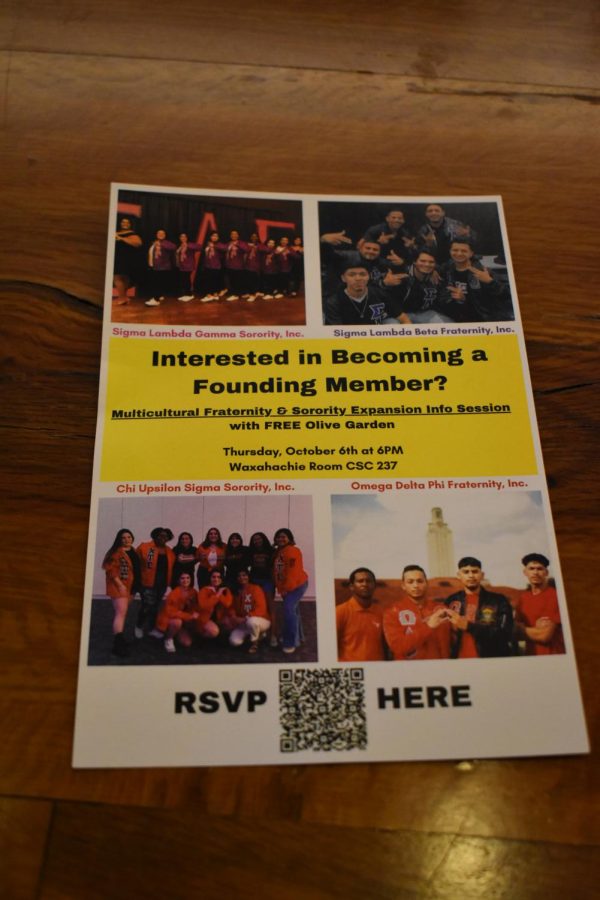Journalist Ted Koppel boasts an impressive career, covering conflicts from Southeast Asia to the hostage crisis in Iran. Founder of “Nightline,” Koppel anchored and managed the revolutionary nightly news broadcast for 26 years.
Koppel addressed a large crowd of Trinity students and members of the public in Laurie Auditorium on Nov. 1, presenting his lecture, “The Future of Journalism: A Brave New World.” While he spoke of his personal history, Koppel’s lecture chiefly covered the interactions between journalism and the current state of affairs, with particular interest in terrorism, cyber warfare and the importance of accepting good journalism to receive information on critical events.
Koppel’s visit was a part of the Distinguished Lecturer Series. After he was introduced by Danny Anderson, president of the university, Koppel asked members of the audience to shake hands with the person sitting behind them in the spirit of unity in a time of political division.
Koppel continued to keep the mood light and conversational throughout the lecture, despite the more serious subject matter, choosing to sit on a stool instead of behind the podium. Koppel ended his lecture with an impression of Richard Nixon that impressed the older audience and with an original song inspired by his visit to the Great Wall of China with the former president. Koppel then interrupted the question and answer session to tell an anecdote about Henry Kissinger forgetting to zip up his pants.
In his lecture, Koppel touched on the interactions between the media and the current U.S. president.
“We are caught in this death struggle between the president and the media. It’s not a death struggle “” it’s a dance of life. He needs us, and we need him. The New York Times is doing better now than ever,” Koppel said.
Koppel also spoke of the importance of objective, fact-based journalism.
“I’ve made it a point over the course of my political career to not talk about my political beliefs and who I vote for,” Koppel said. “I think it is very important to have a core of journalists who remain objective, who don’t editorialize. We are obsessed with dividing ourselves. If the minute I say I’m a Trump supporter or a Trump adversary, you disbelieve everything I say, then there is no use for me. A nation like ours cannot survive without objective journalism.”
Koppel also spoke about President Trump in relation to his predecessors in a press conference before the event.
“What we have never seen before is a president who jumps into the arena himself and says he doesn’t need the media as an intermediary, “˜I’ll just tweet to my thousands of followers.’ The president looks upon journalism as an obstacle of getting his message across,” Koppel said.
In a press conference held earlier in the day, Koppel spoke of the changes in how the public received their news, encouraging people to question the accuracy of their sources.
“More people get their news from Facebook than from the New York Times and the Washington Post and the Wall Street Journal put together. Those are three great newspapers. If I was the czar of American media consumption, you ought to read all three of those newspapers every day,” Koppel said.
Koppel also commented on the state of journalism in the American political climate.
“A democracy cannot survive in this kind of a climate, where everything and everyone is suspect, where everything in journalism is being denounced, where no one who is a journalist is believed unless he or she reflects the political viewpoint of the person who is under discussion,” Koppel said. “That’s dangerous. We need to make our decisions in a democracy based on facts, real things, not matters of opinion.”
Connie Laing, a sophomore communication major, was present for the lecture.
“I was interested to hear about his process and his approach to new stories,” Laing said. “I really enjoyed the lecture and found it insightful to the effects the internet has on the speed at which information is now delivered versus what it was during the Vietnam War.”
Mackenzie Hill, senior communications major and executive producer of “Newswave” on TigerTV, introduced Koppel to a class of students earlier in the day.
“As someone interested in broadcast journalism, it was incredible to not only listen to Ted Koppel speak, but to meet him,” Hill said. “With 50 years in the industry, he had such insight about how students can handle how different the media is now versus in the past. He encouraged us to have a well-rounded relationship to the media, for us to watch CNN, MSNBC, FOX, and all of the above so that we were getting every perspective. For those of us interested in a similar career, he told us that we really need to love journalism to pursue it because it’s a tough and thankless job.”
Koppel also provided advice for young journalists in media today.
“There’s no such thing as a boring subject. There are only boring ways of telling it,” Koppel said. “Stick to the facts. Journalism is not a matter of opinion. Journalism is trying to get the facts as objective as you can and presenting them accurately to the public. A good journalist is like a good mapmaker, and a good mapmaker can take an entire city and reduce it to a single page, and someone can take that page and follow it from point A to point B without getting lost.”







Patricia Yeiser • May 2, 2020 at 11:45 am
The GNU York TImes, and the WAPOST are not reasonable arbiters of reporting. They have been after Pres Trump since he declared his candidacy. They keep at him and at him -there is no balance. Read them with that understanding and get news from other sources.